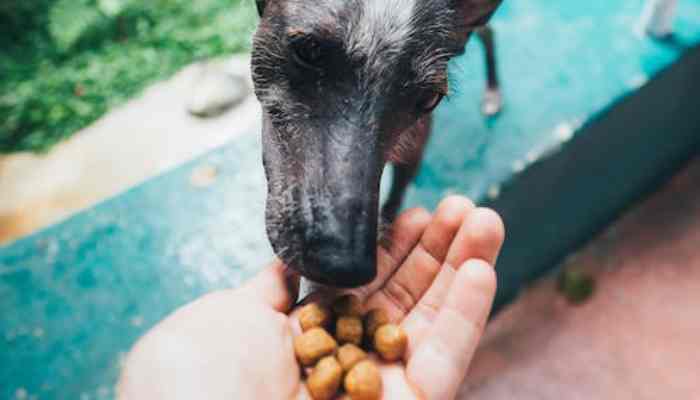As our dogs age, their nutritional needs change. As a loving pet parent, it’s our responsibility to make sure they’re getting the right nutrients to support their health and wellbeing. But with so much information out there, it can be overwhelming to know where to start. That’s why we’ve created the ultimate guide to senior dog nutrition! In this comprehensive guide, we’ll cover everything you need to know about feeding your ageing furry friend, from understanding their changing nutritional needs to choosing the right food and managing health issues through diet. So, get ready to give your senior pup the nourishment they deserve and help them age gracefully with our guide.
I. Understanding the Nutritional Needs of Senior Dogs
As dogs age, their nutritional needs change. It’s important to understand these changes to ensure that our senior dogs receive the proper nourishment to maintain their health and wellbeing. In this section, we’ll dive into the specific nutritional needs of senior dogs, so you can make informed decisions about what to feed your furry friend.
Energy Requirements
Senior dogs often have different energy requirements compared to younger dogs. As they age, they tend to be less active and have a slower metabolism, so they may require fewer calories. However, it’s important to ensure that they’re still getting enough nutrients to maintain their overall health and well-being.
Protein Requirements
Senior dogs typically require less protein compared to younger dogs as their muscle mass decreases with age. However, it’s still important for them to receive adequate amounts of high-quality protein to support their overall health, including their muscles, bones, and immune system. The ideal protein intake for senior dogs can vary based on their size, breed, and activity level, so it’s important to consult with a veterinarian to determine their specific needs.
Fat Requirements
Senior dogs require a balanced amount of fat in their diets to maintain good health. Fats provide energy and support skin and coat health. Look for a dog food that contains healthy fats, such as salmon oil or flaxseed oil.
Vitamin and Mineral Requirements
Older dogs require specific vitamins and minerals to support their overall health. For example, they need extra vitamin D to maintain strong bones and extra antioxidants to support their immune system. Make sure to choose a dog food that contains these important nutrients.
Hydration Needs
Senior dogs need adequate hydration to maintain their overall health. Make sure to provide fresh, clean water at all times, and consider wet food as a way to increase your senior dog’s water intake.
II. Choosing the Right Food for Your Senior Dog
With so many options on the market, choosing the right food for your senior dog can be overwhelming. In this section, we’ll explore the different types of food available and what to look for when selecting a diet for your ageing furry friend.
Wet vs. Dry Food
Wet food provides more moisture than dry food, which can be helpful for senior dogs that may have trouble drinking enough water. Dry food, on the other hand, is convenient and has a longer shelf life. Consider your senior dog’s individual needs and preferences when choosing between wet and dry food.
Homemade vs. Commercial Diets
Homemade diets can provide fresh, whole ingredients, but can be time-consuming to prepare and may not provide complete and balanced nutrition. Commercial diets are convenient and formulated to provide complete and balanced nutrition, but it’s important to choose a high-quality brand.
Understanding Dog Food Labels
When selecting a commercial diet, it’s important to understand the information provided on the label. Look for a dog food that provides complete and balanced nutrition, lists high-quality protein sources as the first ingredient, and contains essential vitamins and minerals.
Supplementation
In some cases, senior dogs may need additional nutrients that can be provided through supplementation. For example, a joint supplement may be needed to support joint health. Work with your veterinarian to determine if supplementation is necessary and to select an appropriate product.
III. Feeding Your Senior Dog
As dogs age, their nutritional requirements may alter, making it crucial to provide the right sustenance for their senior years. In this section, we’ll delve into portion management, meal timing and frequency, diet modifications, and addressing food-related health problems.
Portion Management
As dogs grow older, their activity levels may decrease leading to calorie surplus and weight gain. It’s essential to adjust meal portions to prevent overconsumption. Work with your veterinarian to determine the correct portion size for your senior dog.
Meal Timing and Frequency
Older dogs may have decreased physical activity and could benefit from more frequent, smaller meals throughout the day to regulate blood sugar and reduce digestive discomfort. Your veterinarian can help you determine the best meal timing and frequency for your senior canine.
IV. Addressing Health Issues with Nutrition
Nutrition plays a crucial role in maintaining your dog’s overall health, especially as they age. Let’s explore how nutrition can address various health issues, including arthritis and joint health, dental health, heart health, liver and kidney health, and digestive health.
Arthritis and Joint Health
Arthritis is a common issue in older dogs, and the right nutrition can help support joint health. Consider adding foods high in omega-3 fatty acids, such as fish oil, to your dog’s diet, as well as glucosamine and chondroitin supplements. Work with your veterinarian to determine the best approach for supporting joint health for your senior dog.
Dental Health
Feeding and dental health are closely related for senior dogs. As dogs age, they may be more prone to dental problems such as gum disease, tooth decay, and bad breath, which can be exacerbated by an improper diet. It’s important to provide a balanced diet that supports dental health, including crunchy kibble and chews, which can help clean teeth and prevent tartar buildup. Soft, wet food can also contribute to dental problems, so it’s important to consider this when selecting a diet for your senior dog.
Heart Health
Feeding and heart health are closely related for senior dogs. As dogs age, they may be more prone to heart disease, which can be exacerbated by an improper diet. It’s important to ensure that senior dogs are receiving the right nutrients to support their heart health, such as omega-3 fatty acids, antioxidants, and taurine. Omega-3 fatty acids help reduce inflammation and improve heart function, while antioxidants protect against oxidative stress that can contribute to heart disease. Taurine is an amino acid that is essential for heart health, particularly in dogs. To support your senior dog’s heart health, consider feeding them a high-quality senior dog food that is specifically formulated to meet their needs, or work with a veterinary nutritionist to create a customized diet plan.
Liver and Kidney Health
In older pups, eating and liver and kidney health are tightly related. Dogs may experience a reduction in liver and kidney function as they age, increasing their vulnerability to health problems. It’s crucial to provide them a balanced diet that promotes the health of their liver and kidneys and helps ward off any potential issues. For dogs with liver disease, low-protein diets may be advised, whereas dogs with kidney disease may benefit from a moderate-protein diet. In order to promote liver and kidney function and remove toxins, proper water is also crucial. A dog with kidney illness may also benefit from avoiding foods high in phosphorus because excess phosphorus can damage the kidneys. To support your senior dog’s liver and kidney health, consider feeding them a high-quality senior dog food specifically formulated for their needs, or work with a veterinary nutritionist to create a customized diet plan.
Digestive Health
Feeding and digestive health are critical components of overall health for senior dogs. As with ageing, they may be more prone to digestive problems such as constipation, diarrhea, and upset stomach, which can be exacerbated by an improper diet. It’s important to provide a balanced diet that supports digestive health, including fiber-rich foods, which can help regulate bowel movements and prevent constipation. Choosing a high-quality, easily digestible protein source can help support digestive health and reduce the risk of upset stomach. To support your senior dog’s digestive health, consider feeding them a high-quality senior dog food specifically formulated for their needs, or work with a veterinary nutritionist to create a customized diet plan. It’s also important to monitor their eating habits and adjust their diet as needed to address any digestive issues that may arise.
Feeding your senior dog is about more than just filling their belly. It’s about providing the right nutrients and support to help them live their best life as they age. By understanding their unique nutritional needs, controlling portion sizes, timing meals, making diet changes, and addressing health issues, you can ensure that your senior dog remains happy, healthy, and full of life for years to come!


